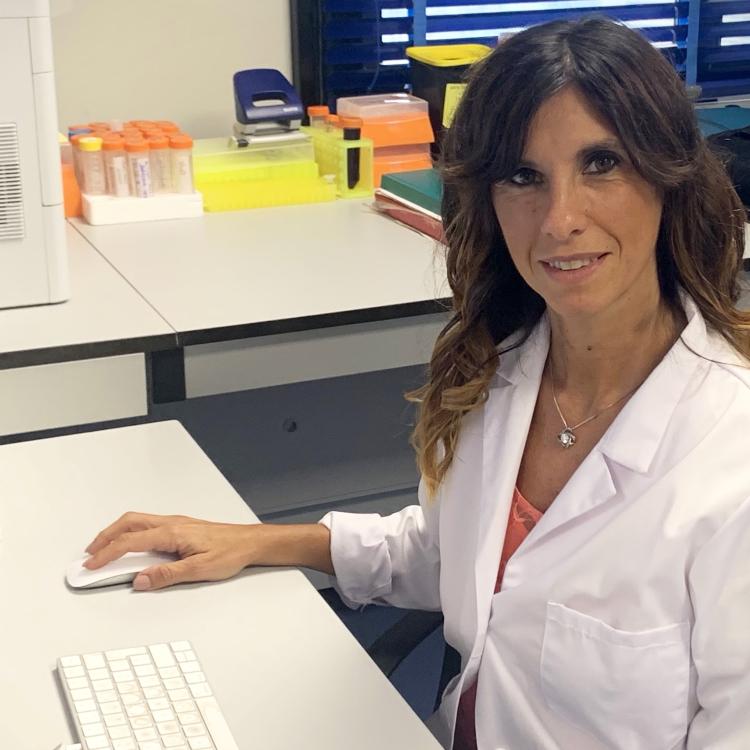
Monica Dentice
My interest focuses on the molecular mechanisms regulated by thyroid hormone (TH) transcriptional signature in pathophysiological processes. My studies aim at identify the mechanisms linking alterations in cell-specific TH metabolism to tissue pathophysiology in the skin, heart, growth plate and skeletal muscle. We pioneered the concept that, besides the systemic constant supply of TH, the intracellular metabolism of TH is a critical determinant of tumor progression. More recently, we are focusing our attention on the role of TH signaling in the tumor microenvironment, in particular on the metabolic pathways regulated by TH and in general by the steroid hormones and their nuclear receptors in cancer progression and metastatic formation.
Positions
2003-2005 Postdoctoral Fellow Thyroid Division, Harvard Medical School, Boston, MA, USA
2005-2015 Postdoctoral Fellow Department of Clinical Medicine and Surgery, University of Naples, “Federico II”
2016-2017 Assistant Professor Department of Clinical Medicine and Surgery, University of Naples, “Federico II”
2017-today Associate Professor Department of Clinical Medicine and Surgery, University of Naples, “Federico II”
Thyroid hormones (T4 and T3) are key endocrine regulators of several biologic functions. Their primary mode of action is binding to the TH receptors in the nucleus and imposing a signature of gene expression that activates or inhibits the transcription of target genes. Intracellular TH signaling does not faithfully reflect TH levels in plasma, rather it is adapted inside the cell where TH signaling is modified via the action of deiodinases. D2 confers on cells the capacity to produce extra amounts of T3 and thus enhances TH signaling. In contrast, D3 expression results in the opposite action. D3 is an oncofetal protein rarely expressed in adult life, but re-activated in proliferating and neoplastic contexts. Our research group is focused on the study of the molecular mechanisms regulated by thyroid hormone (TH) transcriptional signature in pathophysiological processes. Our work aims at identify the mechanisms linking alterations in cell-specific TH metabolism to tissue pathophysiology in the skin, heart, growth plate and skeletal muscle. We pioneered the concept that, besides the systemic constant supply of TH, the intracellular metabolism of TH is a critical determinant of tumor progression. More recently, we are focusing our attention on the role of TH signaling in the tumor microenvironment, in particular on the metabolic pathways regulated by TH and in general by the steroid hormones and their nuclear receptors in cancer progression and metastatic formation.
1. The intracellular metabolism of Thyroid Hormone in the epithelial tumorigenesis
2. Effects of Type 2 Deiodinase modulation in the tumor progression and epithelial-mesenchymal transition of Squamous Cell Carcinoma.
3. Effetti della modulazione muscolare degli ormoni tiroidei sul metabolismo energetico
My interest focuses on the molecular mechanisms regulated by thyroid hormone (TH) transcriptional signature in pathophysiological processes. My studies aim at identify the mechanisms linking alterations in cell-specific TH metabolism to tissue pathophysiology in the skin, heart, growth plate and skeletal muscle. We pioneered the concept that, besides the systemic constant supply of TH, the intracellular metabolism of TH is a critical determinant of tumor progression. More recently, we are focusing our attention on the role of TH signaling in the tumor microenvironment, in particular on the metabolic pathways regulated by TH and in general by the steroid hormones and their nuclear receptors in cancer progression and metastatic formation.
- Nunzia Cicatiello, Post Doc
- Emery Di Cicco, Post Doc
- Giuseppina Mancino, Borsista
- Caterina Miro, Post Doc
- Melania Murolo, Borsista
- Annarita Nappi, Dottoranda
- Serena Sagliocchi, Dottoranda
1. Di Girolamo D, Ambrosio R, De Stefano MA, Mancino G, Porcelli T, Luongo C, Di Cicco E, Scalia G, Vecchio LD, Colao A, Dlugosz AA, Missero C, Salvatore D, Dentice M. Reciprocal interplay between thyroid hormone and microRNA-21 regulates hedgehog pathway-driven skin tumorigenesis. J Clin Invest. 2016 Jun 1;126(6):2308-20.
2. Miro C, Ambrosio R, De Stefano MA, Di Girolamo D, Di Cicco E, Cicatiello AG, Mancino G, Porcelli T, Raia M, Del Vecchio L, Salvatore D, Dentice M. “The Concerted Action of Type 2 and Type 3 Deiodinases Regulates the Cell Cycle and Survival of Basal Cell Carcinoma Cells”. Thyroid. 2017 Apr;27(4):567-576.
3. Sagliocchi S, Cicatiello AG, Di Cicco E, Ambrosio R, Miro C, Di Girolamo D, Nappi A, Mancino G, De Stefano MA, Luongo C, Raia M, Ogawa-Wong AN, Zavacki AM, Paladino S, Salvatore D, Dentice M. “The thyroid hormone activating enzyme, type 2 deiodinase, induces myogenic differentiation by regulating mitochondrial metabolism and reducing oxidative stress”. Redox Biol. 2019 Jun;24:101228.
4. Miro C, Di Cicco E, Ambrosio R, Mancino G, Di Girolamo D, Cicatiello AG, Sagliocchi S, Nappi A, De Stefano MA, Luongo C, Antonini D, Visconte F, Varricchio S, Ilardi G, Del Vecchio L, Staibano S, Boelen A, Blanpain C, Missero C, Salvatore D, Dentice M. “Thyroid hormone induces progression and invasiveness of squamous cell carcinomas by promoting a ZEB-1/E-cadherin switch”. Nature Communications 2019 Nov 27;10(1):5410.
5. G. Mancino, A. Sibilio, C. Luongo, E. Di Cicco, C. Miro, AG Cicatiello, A. Nappi, S. Sagliocchi, R. Ambrosio, MA De Stefano, D. Di Girolamo, T. Porcelli, M. Murolo, F. Saracino, G. Perruolo, P. Formisano, M. Stornaiuolo, and M. Dentice. The thyroid hormone inactivator enzyme, Type 3 deiodinase, is essential for coordination of keratinocyte growth and differentiation. Thyroid 2020. IF: 7.557.
